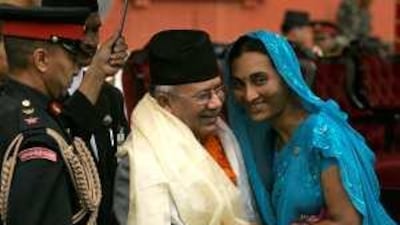MUMBAI // A new government was sworn in in Nepal yesterday, ending weeks of political uncertainty spawned by the resignation of the Maoist leader, Pushpa Kamal Dahal, as prime minister this month. Madhav Kumar Nepal, 56, the leader of the Communist Party of Nepal (Unified Marxist Leninist), was elected for the top job on Saturday by a loose coalition of 22 political parties, which have 350 seats in the 601-seat constituent assembly, a sufficient number to form a stable government.
After an eventful reign of eight months in power, Mr Dahal, who is still popularly known by his nom-de-guerre, Prachanda, or "the fierce one", is all set to lead the main opposition, a new role for the former rebel leader who led a decade-long bloody guerrilla war against government forces until 2006. "After weeks of a power vacuum, a legitimate government has emerged," said Yuvraj Ghimire, a political analyst and editor of Samay, a Kathmandu-based weekly magazine.
Led by Mr Nepal, 22 of 24 political parties in the Nepalese parliament coalesced to form a government after the Maoist-led government collapsed in early May following a bitter power struggle with Ram Baran Yadav, the country's president, over its decision to sack Nepal's army chief, Rukmangad Katuwal. The Maoists accused the army chief of failing to integrate former rebel fighters - currently quarantined in United Nations-monitored camps - into the military, as part of a 2006 peace accord that put an end to the insurgency.
They also accused him of ignoring government orders to stop recruiting soldiers until the issue of integrating rebels was resolved. But Mr Yadav annulled Mr Katuwal's dismissal, and asked him to resume his duties as army chief, a decision that angered Prachanda, who stepped down as prime minister in protest, vehemently accusing the president of a "constitutional coup" for reversing his decision. This sparked off a serious political crisis, the worst that this impoverished Himalayan nation of 28 million has seen since the 2006 peace deal.
While that crisis has subsided with the swearing-in of Mr Nepal, political analysts voiced misgivings over the ability of the new prime minister's fractious coalition to function with the Maoists sitting in opposition. "They [the Maoists] will resort to weakening the organs of the state," Mr Ghimire said. "They will be hard to rein in." While the Maoists are unlikely to return to armed rebellion, their leaders, still hankering for power, are expected to resort to "violent agitations and bandhs [strikes] that can seriously put the new government in jeopardy," said Om Gurung, who heads the Kathmandu-based Nepal Federation of Indigenous Nationalities.
This comes at a time when Nepal's fragile peace process faces daunting challenges, Mr Gurung said. Despite a lasting military ceasefire with the Maoists, a slew of critical issues are still unresolved, which will test the mettle of Mr Nepal's new government: after this crisis, the future of the country's two armies - the conventional army and the People's Liberation Army (PLA) of the Maoists hangs in limbo; little progress has been made in writing the country's new constitution or returning land seized during the conflict to original inhabitants.
"Achieving all these goals is crucial in ensuring the peace process remains on track," Mr Gurung said. Prachanda formed his Maoist-led government last year after a decisive victory in parliamentary elections, but he has been accused of being too rigid in his stand-off with the military. He refused to back down on a demand to integrate all PLA cadres into the Nepalese army, which the army and the main opposition parties had objected to.
"Since they are no longer a part of the government, it will be harder for the coalition to offer a solution [on the issue of integration] acceptable to the Maoists," Mr Gurung said. Since the crisis began, the Maoists have on some occasions prevented the constituent assembly from holding its regular session. A week ago, Maoist politicians stormed the Nepalese parliament to obstruct the vote for prime minister.
In recent days, his cadres have rocked the country with vehement demonstrations in various towns, burning the effigy of the new prime minister. Prachanda and his entire entourage of Maoist leaders stayed away from the swearing-in ceremony of the new government yesterday. But he said his party will co-operate with the new government on important issues, even though he does not support them. He has also ruled out returning to armed conflict or opposing the government through violent means.
"We will not capture state power through arms as widely speculated," he said in a statement. "We will not be provoked, but the fight for civilian supremacy will continue through the streets and parliament." achopra@thenational.ae

